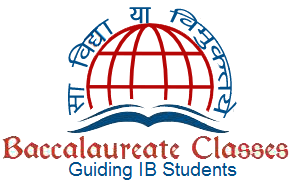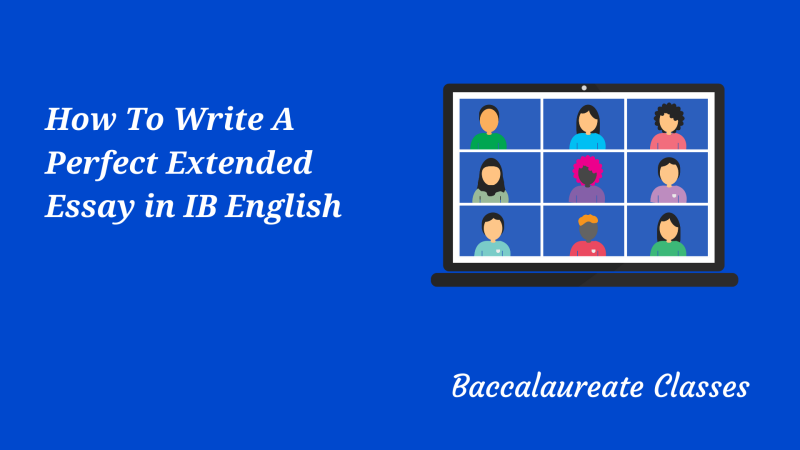OUR BLOG
How To Write A Perfect Extended Essay in IB English
The extended essay is one of the largest independent tasks that IBDP students have to tackle during their studies. If the 4,000 word research paper is daunting for you, reach out to English experts at Baccalaureate Classes, India’s leading IB online tutoring service, to receive guidance required to complete the essay and develop research and writing skills on the way. The following guide will take you through the EE process and share necessary tips and tricks with you to perfect your essay.
Formulate a Focused Research Question
Is your research question focused and clearly stated? Make sure your research question is an actual question with a question mark. Once you’ve got that down in your IB online tuition, don’t get sidetracked and ensure your essay constantly links back to it. Our IB English online tutor claims that most students lose marks because they don’t stick to the question and make continuous digressions. Our IB online tutor suggests 5 steps you should follow to develop a clear research question:
- Carry out preliminary reading once you’ve chosen a topic that interests you.
- Ask yourself open-ended questions about your EE topic. Ensure that these questions address the ‘how’ and the ‘why’.
- Mull over the questions you’ve shortlisted and evaluate them on the basis of their clarity, agreeability, and specificity. The reader should be able to understand the intent behind your research and what it entails. Your question should also be well-focused to permit you to explore the topic within the number of words available to you.
- Your question may also open avenues for future scope of research in the English subject. Make sure you consider the possible outcomes of the research you undertake. If your research is insufficient to support your arguments, perhaps you need to reconsider your question.
- Restate your question using different terms of command to view your EE topic from every possible perspective.
An example of an unfocused research question would be: What is the history of Shakespearean theatre? An improved version of it, as suggested by our IB English tutor, would read as: How does the legacy of Shakespeare contribute to modern theatre? The latter is a clear question that lends itself to in-depth research.
Streamline your Research
Recording your thoughts and ideas is essential to stay on track. Our IB English tutor recommends you use online brainstorming platforms like Mind Map Inspiration, Coggle, Bubbl and Stormboard to group your resources and add structure to your train of ideas. Coggle also allows you to draw mind maps and informative diagrams which you can share with your supervisor to keep them in the loop. If you’re new to mind mapping, our IB English online tutor suggests you visit Mind Map Inspiration to see the process from start to finish.
You can choose from an array of digital archives, websites, online repositories, e-libraries for up-to-date, diverse and relevant research on all things literature, including Classical, Renaissance, Victorian, American, Drama, Feminism and Women’s Literature. Artstor’s database, for example, comprises contributions from acclaimed photographers, international museums, scholars, libraries, and artists, among others. Our IB online tutor suggests you to make sure that there’s a range of diverse sources available on the EE topic you want to research on and that they are easily accessible. Identify the books, articles, primary and secondary sources you’ll be using in the process.
Create a Personal Timeline
Our IB online tutors suggest you spend at least 40 hours on the EE process. With that in mind, it is important you stay proactive and prepare your own personal deadlines for research, writing and reflection required for your EE process. Our IB online tutors suggest 5 steps you should follow to manage your time effectively:
- Be self-aware of how long it takes you to complete a research/writing/editing/proofreading task.
- Learn to expect delays and be proactive in minimising the cause of recurrent ones.
- Set aside time for leisure and relaxation. Our IB tutors suggest you follow the Pomodoro method for maximising your productivity. The Pomodoro technique keeps your mental performance high while alternating between relaxation and concentration. The idea is to break down all your tasks into 25 minute blocks with 5-minute relaxation breaks between each block. After four Pomodoros, you can avail a longer break for 15-30 minutes.
- Get the most out of your day by planning every waking minute. Our IB tutors advise 11th and 12th grade students to choose a planner and pencil in their activities in it. Having a planner handy means that you can also list out tasks that come into your mind on the spot.
- Define short-term and long-term goals and build your schedule around them. Our IB tutor’s tip: Learning specific reading strategies will help you comprehend and study better.
Assemble Information Logically
After accumulating the information you found online as well as offline, carefully consider and select the best material for use in your EE. Our IB tutor advises you to follow these 5 steps to evaluate your material:
- Consider the timeliness of the material. You can learn how to differentiate between current information and older sources in our IB English tuition. Ensure that the source link you’re using is revised, updated and functional.
- Ensure that the information is relevant to your topic and is at an appropriate level. It should neither be too elementary nor too advanced.
- Make sure the author is qualified to talk about your EE question. Carefully peruse through the author’s credentials and organisational affiliations.
- Consider the correctness and reliability of the content.
- Define the purpose of the information at the beginning. Is it to persuade, teach, sell or inform?
Nothing is better than EE to prepare for undergraduate research and to investigate a topic of special interest. Reach out to Baccalaureate Classes and avail our English IB tuition to develop the capacity to synthesise, analyse and evaluate knowledge.

